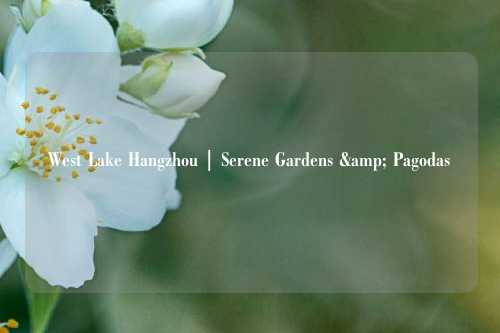West Lake Hangzhou | Serene Gardens & Pagodas
Hangzhou, often referred to as "Heaven on Earth," is a city where natural beauty and rich culture harmonize perfectly. At the heart of this enchanting city lies West Lake, a UNESCO World Heritage Site renowned for its serene gardens, ancient pagodas, and picturesque landscapes. This article takes you on a journey to explore the charm of West Lake Hangzhou, uncovering the secrets of its gardens and pagodas, and why it continues to captivate visitors from around the globe.
Nestled in the heart of Zhejiang Province, Hangzhou is a city that ly blends history, culture, and nature. Its crown jewel, West Lake, is not just a body of water but a living poem that has inspired artists, poets, and travelers for centuries. The lake’s tranquil surface mirrors the surrounding hills, islands, and classic Chinese gardens, creating a scene that feels almost otherworldly.

West Lake is divided into five sections, each with its own character and charm. The Outer Lake, the most part, offers breathtaking views of the causeways and islands. In spring, the lake is dotted with blooming cherry blossoms, while in autumn, the fiery red leaves of the surrounding hills create a stunning backdrop. The Inner Lake, on the other hand, is known for its peaceful ambiance, perfect for those seeking a quiet retreat from the bustling city life.
The West Lake’s beauty is not just confined to its water; the gardens and pagodas that line its shores are equally captivating. The gardens, ly designed, showcase the art of Chinese landscape architecture. Serpentine pathways lead visitors through vibrant flowerbeds, serene lotus ponds, and manicured trees, creating a sense of harmony between man and nature. These gardens are not just places of beauty but also reflections of the city’s deep-rooted heritage.
One cannot talk about West Lake Hangzhou without mentioning its iconic pagodas. The Leifeng Pagoda, with its red-tiled roof and stone carvings, stands as a symbol of the city’s rich history. Originally built in the 10th century, the pagoda has undergone several reconstructions, the latest in 2002. Its observation deck offers panoramic views of the lake and the surrounding landscape, making it a favorite spot for photographers and travelers alike.
Another must-visit is the Feilai Peak, a limestone formation that dates back 170 million years. The peak is adorned with carvings of Buddhist and Taoist figures, each telling a story of its own. Walking around the peak feels like stepping into a world where mythology and history converge, offering a glimpse into China’s spiritual past.
The West Lake is also home to the Xiling Causeway, a man-made堤that connects the lake’s western and eastern sides. This causeway is not just a pathway; it’s a corridor of history and culture. It was built during the Song Dynasty and has since been a witness to countless historical events. Today, it’s a popular spot for strolling, cycling, and enjoying the lake’s scenic views.
Despite its long history, West Lake Hangzhou continues to evolve, adapting to the changing times while preserving its timeless charm. The city’s commitment to sustainability and preservation ensures that the lake and its surroundings remain pristine, offering future generations a chance to experience its beauty.
The serene gardens and pagodas of West Lake Hangzhou are not just scenic attractions; they are gateways to the city’s soul. Each garden tells a story, every pagoda whispers a legend, and together, they paint a picture of a city that values its past while embracing the present.
One of the most iconic gardens along West Lake is the Yangzhou Garden, a Ming Dynasty-era garden that has been ly preserved. The garden’s design is a masterclass in balance and harmony, with its latticework walls, lotus-filled ponds, and carefully arranged rocks. Walking through the garden feels like stepping into a work of art, where every element has been ly placed to create a sense of peace and tranquility.
The garden’s main hall is a testament to the skill of ancient Chinese architects. The structure’s carvings and ornate roof design showcase the craftsmanship of the time, while the garden’s layout reflects the principles of feng shui, ensuring a harmonious flow of energy. The garden is not just a place of beauty but also a place of reflection, where visitors can pause and appreciate the simplicity of life.
Another highlight is the Qiantang Pagoda, a seven-story pagoda that dates back to the Tang Dynasty. The pagoda’s design is a perfect blend of Chinese and Indian architectural styles, a reflection of the city’s diverse influences. The climb to the top is worth it for the breathtaking views of the lake and the surrounding hills. The pagoda also houses a museum that showcases artifacts and exhibits related to the city’s history, offering visitors a deeper understanding of its significance.
The West Lake’s tea houses are another reason to linger. These establishments are perfect for resting and enjoying a cup of tea while soaking in the views. Many of these tea houses have been around for centuries, serving as gathering spots for scholars, poets, and artists. Sitting in one of these tea houses feels like stepping into a piece of history, where the sounds of the lake and the rustle of leaves create a soothing backdrop for conversation and contemplation.
The lake’s islands are also worth exploring. The largest of these is the Solitary Hill, home to the Huaguo Mountain and its iconic pagoda. The hill’s name, which translates to “Flower果Mountain,” is derived from the many flowers that bloom on its slopes. The pagoda, which dates back to the 10th century, offers a glimpse into the city’s spiritual past. The hill’s caves and niches, many of which are adorned with Buddhist statues, add to its mysterious charm.
For those who love art and literature, West Lake Hangzhou is a treasure trove of inspiration. The city has been the subject of countless poems and paintings, with its most famous piece being the “West Lake Poems” by Bai Juyi, a renowned Tang Dynasty poet. The Bai Juyi Memorial Hall, located on the banks of the lake, pays tribute to the poet and his works, offering visitors a chance to delve into the city’s literary heritage.
No visit to West Lake Hangzhou is complete without experiencing its boat rides. The gondolas, operated by local boatmen, offer a way to explore the lake. These boatmen are not just guides; they are storytellers who recount the history and legends of the lake, adding a layer of depth to the experience.
In conclusion, West Lake Hangzhou is more than just a scenic destination; it is a living testament to China’s and natural heritage. Its serene gardens, ancient pagodas, and picturesque landscapes offer a glimpse into a world where beauty and history converge. Whether you are a history enthusiast, a nature lover, or a traveler seeking tranquility, West Lake Hangzhou promises an unforgettable experience. So, pack your bags, head to this enchanting city, and let West Lake Hangzhou captivate your senses.
















